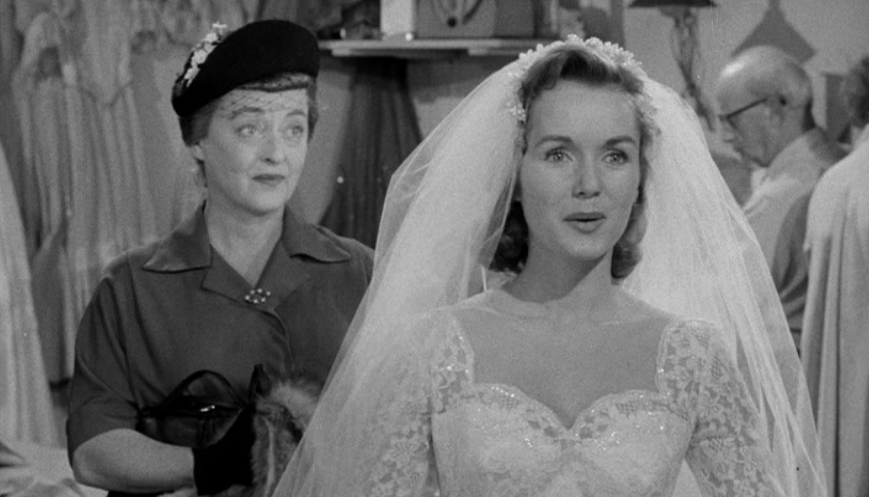I mentioned at the start of the week in conjunction with Debbie Reynolds being TCM's Star of the Month for March that there was was at least one of her movies that I've got on my DVR and haven't done a post on before. That movie is the epic How the West Was Won. It's coming up early tomorrow morning (March 30) at 4:30 AM, so now we get the post on it.
Spencer Tracy narrates this movie that at times feels like an anthology, but is really more of an episodic movie since some of the characters appear in multiple segments, and many of the characters who are only in one segment are all part of the same family. Anyhow, Tracy informs us that it hasn't been all that long since the American frontier was conquered, and that in the early days of trying to move west it was particularly difficult, at least until the construction of the Erie Canal (completed in 1825) really made it a good deal easier to get to at least western Missouri. We then cut to 1839 for the first segment....
The first segment, called "The River" deals with one family trying to migrate west in search of more fertile land, although west here more or less means the Ohio Valley, which I'd have though was fairly comprehensively settled by 1839; Wikipedia suggests Cincinnati had already been incorprated for a generation and had a population in the mid-five-figure range. In any case, the family, the Prescotts, consists of father Zebulan (Karl Malden), mom Rebecca (Agnes Moorehead) and daughters Eve (Carroll Baker) and Lilith (Debbie Reynolds). They meet trapper Linus (James Stewart) before all of them get waylaid by some dubious pirates of the river (their leader is played by Walter Brennan). An accident in river rapids kills Mom and Dad; Eve marries Linus and Lilith heads for greener pastures.
Those pastures take her to Saint Louis in 1850, where she's workin as an enterainer who finds out that she's somehow inherited a gold mine out in California. So as with Westward the Women mentioned recently, she has to go west to California to take possession of the mine. She's followed by some suitors, notably professional gambler Cleve Van Valen (Gregory Peck).
Back to Eve's side of the story, when the Civil War comes she's got an adult son Zeb (George Peppard). Linus and Zeb both go off to fight, but when Zeb sees the hell that war truly is, a confederate he meets (Russ Tamblyn) suggests the two of them desert and go off somewhere together. But there's a lot more tragedy to come.
After the Civil War, the Transcontinental Railroad gets built. Zeb is still in the Army, now in the cavalry, trying to keep the peace with the various Indian tribes despite the fact that Mr. King (Richard Widmark), the man from the railroad, wants to get the track laid and who cares what the Indians think.
Finally, after leaving the Army, there's one last segment that reunites the two branches of the Prescott family. Lilith is forced to sell her home in San Francisco, deciding to retire to a ranch in the Arizona territory. But she's old, so she invites her nephew Zeb, by now married (Carolyn Jones playing his wife) to come along and run the place. When they get to Arizona, Zeb runs into Gant (Eli Wallach), an outlaw who's there to try to steal one of the shipments of gold.
It's easy on watching How the West Was Won to see why it was such a massive commercial success when it was released. The story is actually fairly pedestrian, but the movie was made in Cinerama, so I can only imagine how spectacular it must have been to see the movie as it was intended to be seen in the original Cinerama.
Unfortunately, however, most people don't have the sort of curved screen necessary to see Cinerama in its original aspect ratio and presentation format. In days past, this meant that TV presentations would be cut down, and there would be severe crease-like lines where the various segments of the print were supposed to meet up. Nowadays, restorers have tried to solve that problem through the use of the "smilebox" format that attempts to replicate the experience one would have had in the theater where the left and right edges of the screen are closer to the viewer than the middle.
I'm sorry to say that this doesn't quite work. First, I get the impression that the smilebox format is really more curved than it needs to be. Some of the photos I've seen of Cinerama screens do show a clearly evident curve, but not as much as the smilebox format has. The bigger problem, however, is how translating Cinerama to the smilebox distorts motion. I've always felt like there was something off in Cinemascope backgrounds when there are scenes with long panning in that the motion in parts of the background don't look quite right. In the smilebox format, this is much more severe, almost like what you'd see if you were moving around a sphere with stuff being reflected off of it.
But if you're the sort of person who doesn't tend to notice such distortion, or if you ever get the chance to see it in the original Cinerama (I don't know how many Cinerama screens still exist; would it be possible to translate Cinerama to an IMAX screen?), give How the West Was Won a chance. It's certainly a spectacle.



